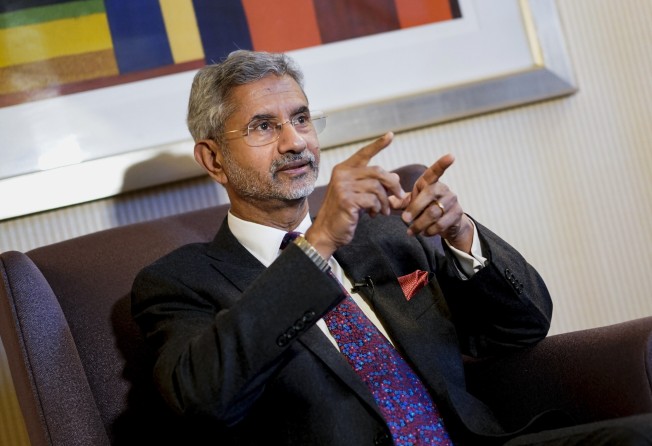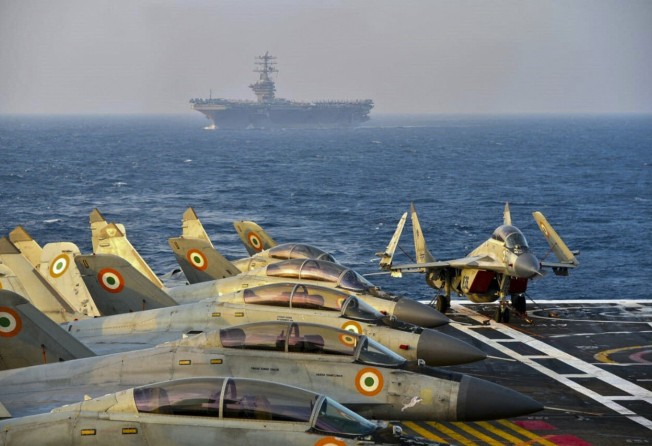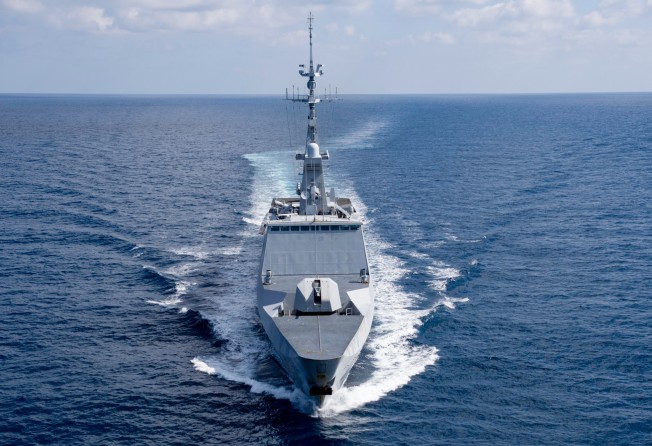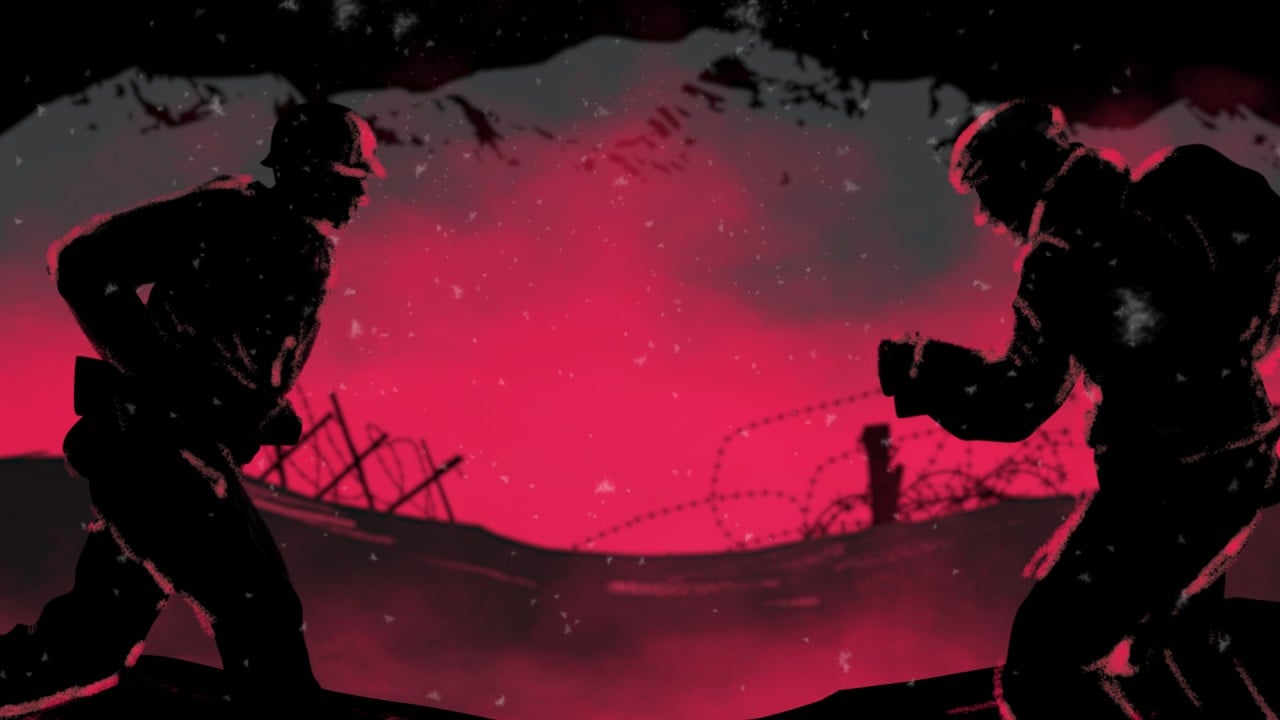
France, India and Australia step up Quad-style cooperation, with China on the horizon
- The three countries, an increasingly active diplomatic collective, are planning to increase their joint presence in the Indo-Pacific
- In a veiled reference to Beijing’s criticism, India’s external affairs minister says ‘people need to get over’ the idea the groupings are a threat

France, India and Australia have indicated they are jointly planning to step up their presence in the Indo-Pacific, modelling their closer cooperation after the Quad’s efforts in areas such as maritime security, according to comments made by their foreign ministers at the annual Raisina Dialogue.
The three ministers were speaking on Wednesday in a virtual discussion at the conference – which was organised this year by the Indian foreign ministry and the New Delhi-based Observer Research Foundation – that came after Australian foreign minister Marise Payne cancelled her trip to the Indian capital due to the Covid-19 pandemic.
Indian external affairs minister S. Jaishankar said the trilateral grouping, in its next meeting, would discuss “something similar” to the list of topics on the agenda of the Quadrilateral Security Dialogue – which also include vaccine cooperation, higher education and student mobility, as well as emerging technology.
The Quad, which consists of the United States, Japan, Australia and India, is largely seen as a measure to contain an increasingly assertive China. Chinese Foreign Minister Wang Yi has called the grouping an “Indo-Pacific Nato” and said it presented a “big underlying security risk”.
On Wednesday, however, Jaishankar dismissed Beijing’s criticisms without naming China, saying that likening the Quad to the North Atlantic Treaty Organisation was a “mind game that others are playing”.

“The idea that when we come together it is a threat or a message to someone, people need to get over this,” he said in defence of the Quad and the France-India-Australia trilateral, adding that the groups were for “national, regional and global benefit”.
After the Quad leaders’ meeting last month, Senior Colonel Ren Guoqiang, a spokesperson for China’s Ministry of National Defence, said Beijing was opposed to the group because it adhered to a “Cold War mentality”.
On Wednesday, Jaishankar, once again without naming China, said the Quad was “overcoming the Cold War, not reinforcing it”.
“I cannot have other people have a veto about what I am going to discuss, with whom and how much I am going to contribute to the world,” he said, adding that New Delhi would not be constrained between the Strait of Malacca and the Gulf of Aden.
Australia’s Payne also made the case for the three countries to take a more active role in the region, saying that the underlying desire driving the grouping was the need for “an open, resilient, inclusive Indo-Pacific”.
“Working together, we have had the opportunity to coordinate our efforts to identify practical solutions to the problems we face, both short term and the more long-term, strategic ones,” she said, adding that all three countries had “sound precedents” of working together on issues such as maritime security and safety.
The statements come as France, India and Australia are becoming an increasingly active diplomatic collective.
In September last year, the three countries had their first-ever trilateral talks at the foreign-secretary level, during which an Indian statement said they had discussed “economic and geostrategic challenges and cooperation in the Indo-Pacific”. Their second trilateral discussion took place in February, leading up to Wednesday’s cancelled meeting.
According to former Indian ambassador Rajiv Bhatia, now a distinguished fellow at the Mumbai-based Gateway House think tank, Paris was seeking to forge a closer bond with the Quad through the France-India-Australia trilateral.
“The Quad is unlikely to be expanded and instead it will have these ‘Quad Plus’ appendages, which is where countries like France come in,” he said, adding that Paris was high up on the list of those seeking to develop relations with the security grouping.
Admiral Philip Davidson, who heads the US Navy’s Indo-Pacific Command, said the Quad was a “diamond of democracies” that should look towards expansion.
“We should think about the Quad in the broadest possible terms and fully realise its potential to create global economic opportunities, including the diversification of supply chains,” he said.
But the trilateral involving France, Bhatia added, was also a message to China from both India and Australia – even without the expansion of the Quad.

New Delhi has since last May been locked in an eyeball-to-eyeball confrontation with Beijing along their disputed border, the Line of Actual Control, with tens of thousands of soldiers, tanks, missiles and rockets lined up on both sides.
Australia, meanwhile, has had a bitter fallout with China after Canberra joined Western democracies led by the US in demanding a probe into the origins of the coronavirus.
“[They] are saying that France is an important military power and to be seen with [Paris] is a plus point for them,” Bhatia said.
France, for its part, is showing signs of reciprocation. French foreign minister Jean-Yves Le Drian, who is on a three-day tour of India, on Tuesday said Paris had agreed to join the India-led Indo-Pacific Oceans Initiative, which is focused on issues such as maritime security, ecology, and resources, as well as trade connectivity.
Apart from inviting the Quad countries to the La Perouse naval exercise held earlier this month, French navy warships are also set to participate in India’s Varuna exercise later this month.
Le Drian on Wednesday said the trilateral needed a concrete push to “strengthen our relationship”.
“India, France and Australia share the willingness to work together, not simply because we get along well or because we share some common interests and concerns. We are democracies and we comply with the rule of law,” he said, in a veiled reference to China.
Other multilateral organisations, from the European Union to Nato, are also signalling their intent on being a part of the Indo-Pacific theatre.
Hours after the three foreign ministers spoke, David McAllister, the chairman of the European Parliament’s foreign affairs committee, said in a discussion at the Raisina Dialogue that the region was of “great economic, strategic and geopolitical importance to Europe”.
His comments come a day after Nato Secretary General Jens Stoltenberg indicated at the Raisina Dialogue that his organisation, primarily meant to be a transatlantic grouping, could increase its presence in the Indo-Pacific.
Calling India an “important partner,” he said the rise of China had implications for “all of us”.
“Nato is a key platform for forging convergence on responding to the security implications of a rising China,” Stoltenberg said, adding that he saw greater engagement with New Delhi. “India and Nato could do more together – consult, coordinate and take concerted action to address global challenges.”
